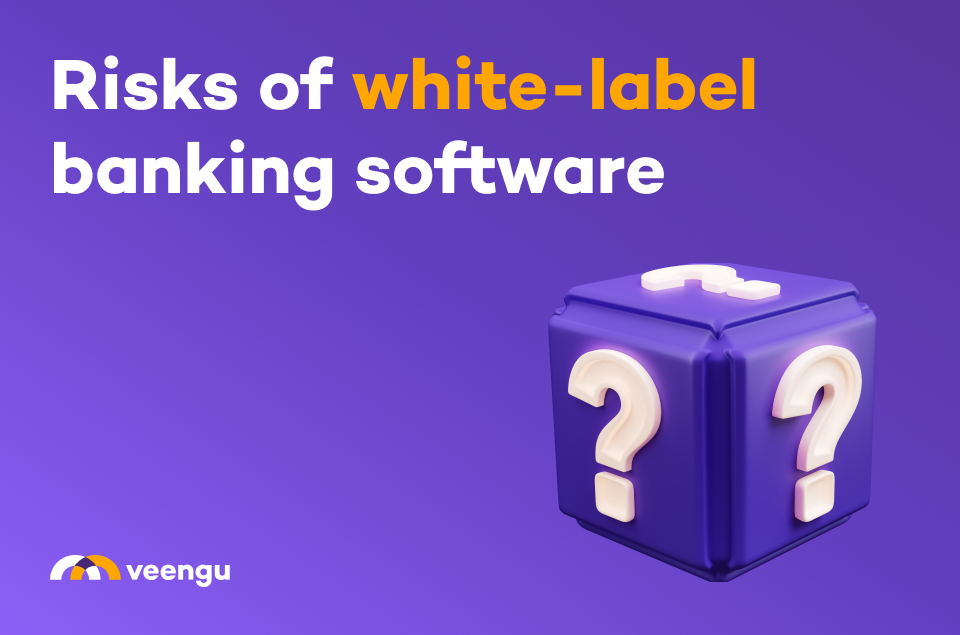In the rapidly evolving landscape of banking technology, the terms “white-label banking software,” “white-label core banking software,” and “white-label digital banking software” have gained significant prominence. But what do these terms actually mean, and how can they benefit your financial institution? In this article, we’ll break down the definitions, advantages, risks, and how Veengu, a trusted industry player, mitigates those risks.

Part 1: Definitions
What is White-Label Banking Software?
White-label banking software refers to a solution developed by a third-party provider and offered to financial institutions, allowing them to rebrand and customize the software as if it were their own. This approach provides a cost-effective and efficient way for banks to enhance their digital services without the need for extensive in-house development.
What is White-Label Digital Banking Software?
White-label digital banking software encompasses a suite of digital tools and services tailored to meet the needs of modern consumers. These solutions cover a range of services, including mobile banking apps, online account management, and digital payment platforms. By adopting white-label digital banking software, financial institutions can provide their customers with a seamless and user-friendly digital experience.
What is White-Label Core Banking Software?
White-label core banking software forms the backbone of a financial institution’s operations. It includes essential functionalities like account management, transaction processing, and core financial services. By leveraging white-label core banking software, banks can streamline their operations, reduce costs, and improve customer service.
Part 2: Advantages of White-Label Banking Software
- Cost-Efficiency: Utilizing white-label solutions eliminates the need for extensive in-house development, reducing both time and costs associated with building custom banking software from scratch.
- Quick Implementation: White-label software is pre-built and ready for deployment. This means faster time-to-market, enabling financial institutions to adapt swiftly to market demands.
- Proven Expertise: Trusted white-label providers have a track record of successful implementations, ensuring that you are leveraging the expertise of seasoned professionals.
- Scalability: As your institution grows, white-label solutions can scale alongside, accommodating increased customer demands and transaction volumes.
- Focus on Core Competencies: By outsourcing software development, your institution can concentrate on its core functions, such as customer service and business expansion.
- Access to Advanced Features: White-label providers often incorporate cutting-edge features and technologies, giving your institution a competitive edge in the market.
- Reduced Risks of In-House Development: Building software in-house can lead to delays, budget overruns, and potential security vulnerabilities. White-label solutions help mitigate these risks.
Part 3: Risks of Using White-Label Banking Software
While white-label banking software offers numerous advantages, it’s essential to be aware of potential risks:
- Limited Customization: Some white-label solutions may have limitations in terms of customization, potentially constraining unique branding elements.
- Dependency on Third-Party Providers: Reliance on external providers means your institution’s performance may be affected by the provider’s stability and support.
- Vendor Lock-In: Without proper precautions, you could become locked into a single provider, limiting your flexibility in the long run.
Part 4: How Veengu Mitigates Risks
Veengu addresses these risks through a range of measures:
- Source Code Escrow: Ensures access to the source code even in unforeseen circumstances, providing long-term security.
- Open APIs: Encouraging the use of standard APIs by third-party developers prevents vendor lock-in and allows for seamless integrations.
- Ownership of Third-Party Accounts: Accounts with external providers are owned by the customer, not Veengu, providing autonomy and control.
- Custom Development Support: Veengu’s team is readily available for tailored feature development and integrations to meet specific requirements.
Part 5: Veengu’s Comprehensive Offering
Veengu doesn’t just provide white-label apps; it offers a complete core banking platform, integration facilities, and ongoing support to guide your fintech project from inception to success.
In conclusion, white-label banking software is a powerful tool for financial institutions looking to stay competitive in a rapidly evolving industry. With Veengu as your trusted partner, you can harness the benefits while mitigating potential risks, ensuring a seamless and efficient transition to a digital-first approach.
For more information on Veengu and white-label banking solutions, visit Veengu’s official website.

